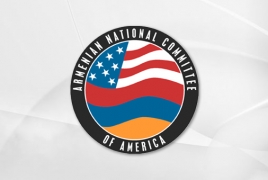ANCA launches Raphael Lemkin Policy Series on Genocide February 14, 2019 - 12:03 AMT PanARMENIAN.Net - The President of the International Association of Genocide Scholars, Dr. Henry Theriault, will headline the inaugural February 27 lecture of the Raphael Lemkin Policy Series, an ongoing Capitol Hill conversation about legal and political challenges and opportunities related to the prevention and punishment of the crime of genocide. Dr. Theriault, who serves as Vice President for Academic Affairs at Worcester State University, will speak at 12:00 noon on Wednesday, February 27 at the Rayburn House Office Building. The Lemkin series is made possible by the ANCA Endowment Fund and the generosity of the Aramian Family – led by sisters Sue, the late Margo, and the late Martha – long-time benefactors of educational and charitable projects in the Armenian homeland and the diaspora. The lecture will be hosted by Congressional Armenian Caucus Vice-Chair Adam Schiff (D-CA), a principled and powerful Congressional advocate for a truthful and just U.S. policy on the Armenian Genocide. “We look forward to Dr. Theriault’s inaugural lecture and to an ongoing, justice-oriented exploration by Congressional and foreign policy community stakeholders of a core challenge of our time – the punishment and prevention of genocide, two core principles at the heart of the Rafael Lemkin’s life work, the UN Genocide Convention,” said ANCA Chairman Raffi Hamparian. “This is a particularly timely program – coming so soon after the enactment of the Elie Wiesel Genocide and Atrocities Prevention Act, and amid renewed atrocities against vulnerable populations around the world.” The series is named after Raphael Lemkin, the lawyer who first coined the term “genocide” after learning about the Armenian Genocide. He led the global movement to adopt the “UN Convention on the Prevention and Punishment of the Crime of Genocide”, which was adopted by the United Nations in December 1948. A landmark of international law, the Convention defines genocide as an international crime. Theriault is President of the International Association of Genocide Scholars (IAGS) and Associate Vice President for Academic Affairs at Worcester State University, after 19 years in its Philosophy Department. Theriault’s research focuses on reparations, victim-perpetrator relations, denial, atrocity prevention, and mass violence against women and girls. He has lectured around the world and published numerous journal articles and book chapters, edited two books, and co-authored – with Samuel Totten – The UN Genocide Convention: A Primer (forthcoming, University of Toronto Press), which features a chapter on Raphael Lemkin. He is a founding co-editor of the journal Genocide Studies International, and from 2007 to 2012 he was co-editor of the journal Genocide Studies and Prevention. Since 2007, he has chaired the Armenian Genocide Reparations Study Group and is co-author of its 2015 report, Resolution with Justice. For more details, see Professor Theriault’s auto-biographical reflection in Totten’s Advancing Genocide Studies: Personal Accounts and Insights from Scholars in the Field (2015).  The Armenian Genocide The Armenian Genocide (1915-23) was the deliberate and systematic destruction of the Armenian population of the Ottoman Empire during and just after World War I. It was characterized by massacres and deportations, involving forced marches under conditions designed to lead to the death of the deportees, with the total number of deaths reaching 1.5 million. Six total incidents have burned 19 old-growth trees. Friday night 8 trees were torched along the beautiful main entrance. The EU does not intend to conduct military exercises with Armenia, Lead Spokesperson for EU Foreign Affairs and Security Policy Peter Stano says. Hikmet Hajiyev has said that there is no place for USAID operation in Azerbaijan any longer. A telephone conversation between Putin and Pashinyan before the CSTO summit is not planned, Peskov says. Partner news |